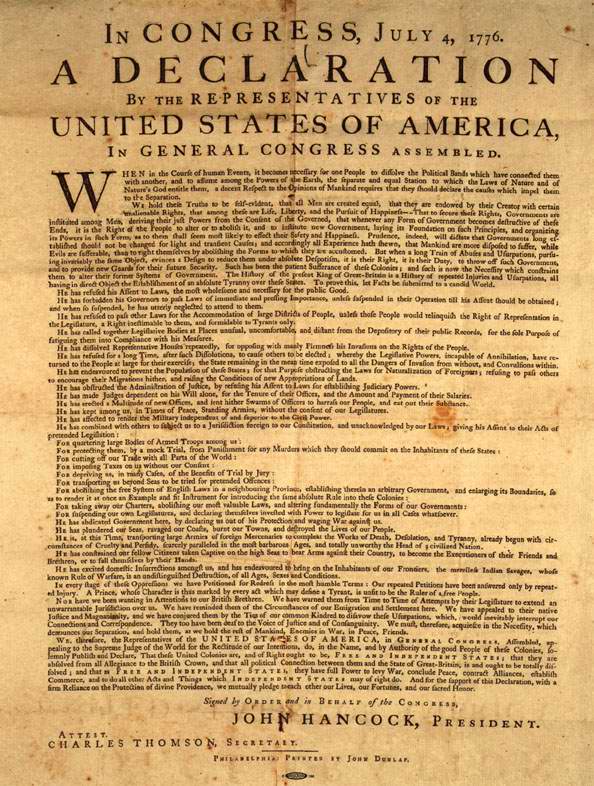I Do Declare
Just in time for July 4th, The New York Times runs a piece about the Declaration Of Independence by Jennifer Schuessler regarding a potential error in the common understanding of the document:
The error, according to Danielle Allen, a professor at the Institute for Advanced Study in Princeton, N.J., concerns a period that appears right after the phrase “life, liberty and the pursuit of happiness” in the transcript, but almost certainly not, she maintains, on the badly faded parchment original.
That errant spot of ink, she believes, makes a difference, contributing to what she calls a “routine but serious misunderstanding” of the document.
The period creates the impression that the list of self-evident truths ends with the right to “life, liberty and the pursuit of happiness,” she says. But as intended by Thomas Jefferson, she argues, what comes next is just as important: the essential role of governments — “instituted among men, deriving their just powers from the consent of the governed” — in securing those rights.
“The logic of the sentence moves from the value of individual rights to the importance of government as a tool for protecting those rights,” Ms. Allen said. “You lose that connection when the period gets added.”
Whether or not an error has been made, I don't see it as leading to a "serious misunderstanding" of the document.
Let's look at the passage in question.
We hold these truths to be self-evident, that all men are created equal, that they are endowed by their Creator with certain unalienable Rights, that among these are Life, Liberty and the pursuit of Happiness. — That to secure these rights, Governments are instituted among Men, deriving their just powers from the consent of the governed, — That whenever any Form of Government becomes destructive of these ends, it is the Right of the People to alter or to abolish it, and to institute new Government, laying its foundation on such principles and organizing its powers in such form, as to them shall seem most likely to effect their Safety and Happiness.
I'm not sure what the big difference in interpretation would be between a period or a dash. There's quite a bit of stuff--famous stuff--before the dash, which is there (period or no) to set apart the first major thought or thoughts from the rest. Yes, we get that government helps ensure these rights--it says so there in the text, no matter what the punctuation is.
But let's assume that this dash somehow makes all the difference. That, for some reason (for instance, that it's the dearest wish of Danielle Allen), it means that the center of gravity in the Declaration has moved from individual rights to the government as a tool. Okay, but let's read the entire paragraph, because we get another bit set off by a dash, which must be equally important then.
And what does this section say? Simple. If the government fails to secure these individual rights, you throw off that government.
So it's still all about individual rights, which at all times rule over what the government does--the government is subservient to these rights, and if it fails to do its primary duty, it's the government that has to go.
In other words, congratulations Professor Allen. If you've spotted an error and it means what you say it means, you've just made the Declaration considerably more anarchistic and dedicated to individual rights than it was before.
So it's still all about individual rights, which at all times rule over what the government does--the government is subservient to these rights, and if it fails to do its primary duty, it's the government that has to go.
In other words, congratulations Professor Allen. If you've spotted an error and it means what you say it means, you've just made the Declaration considerably more anarchistic and dedicated to individual rights than it was before.
And that's the truth. Period.
PS Here's a bit more of the story.
Ms. Allen wrote to the archives in 2012 raising the question, and received a response saying its researchers would look into the matter, followed by silence.
But over the past several months, she has quietly enlisted a number of scholars and manuscript experts in what the historian Joseph J. Ellis, who supports her efforts to open the question, wryly called “the battle of the period.”
You remember Joseph Ellis--the famed historian who lied about his service in Vietnam among other things, and was suspended because of it. Is this the guy you really want on your side?


4 Comments:
Well lying about Vietnam was pretty much standard operating procedure back in the day.
Joe Ellis writes better than the framers and most of the commentators so that's good enough for me
Did anyone check Julia Louis Dreyfus? I hear she's authoritative.
It seems to me the most important error is the use of a comma instead of a colon after "We hold these truths to be self evident", which would have signified that each "that" phrase was part of a list. I think that was the intention, and if so, the period is extraneous, but doesn't changethe meaning at all (it is still a list of truths). And the order suggests that each truth is the reason for the following truth (so it builds a logical argument).
I wonder if Prof. Allen has written any commentary on the fact that Jefferson's original draft said these truths were "sacred and undeniable?" Rev. Witherspoon would have perhaps preferred that language.
Punctuation use, like spelling, has changed since those days.
I'm still sorry they didn't write life, liberty and property (and the pursuit of happiness), which was certainly what they intended.
Post a Comment
<< Home